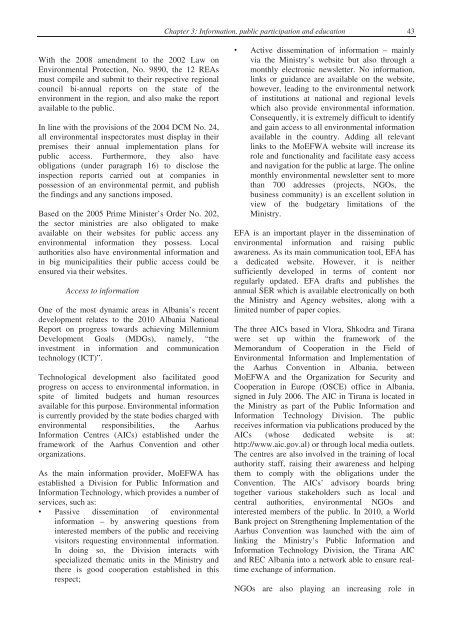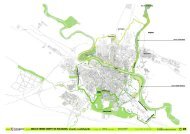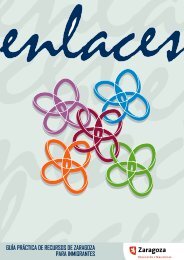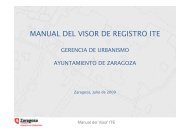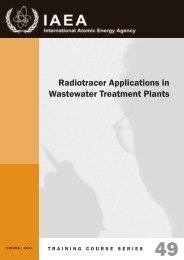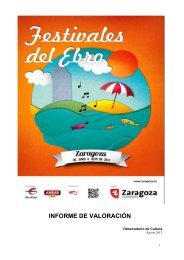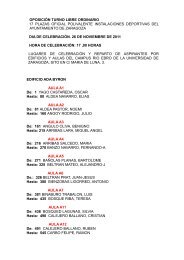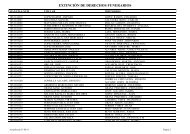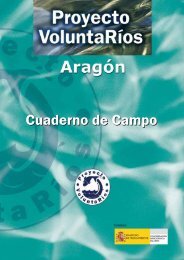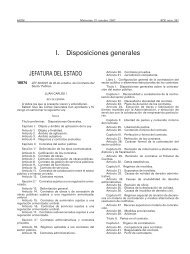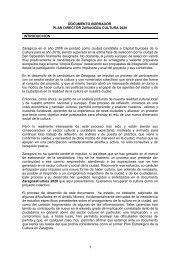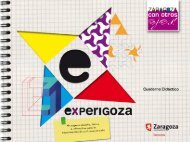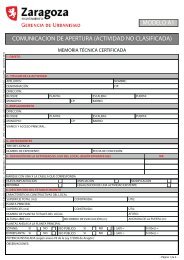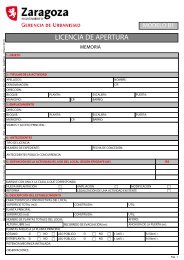Chapter 3: Information, public participation and education43With the 2008 amendment to the 2002 Law on<strong>Environmental</strong> Protection, No. 9890, the 12 REAsmust compile and submit to their respective regionalcouncil bi-annual reports on the state <strong>of</strong> theenvironment in the region, and also make the reportavailable to the public.In line with the provisions <strong>of</strong> the 2004 DCM No. 24,all environmental inspectorates must display in theirpremises their annual implementation plans forpublic access. Furthermore, they also haveobligations (under paragraph 16) to disclose theinspection reports carried out at companies inpossession <strong>of</strong> an environmental permit, and publishthe findings and any sanctions imposed.Based on the 2005 Prime Minister’s Order No. 202,the sector ministries are also obligated to makeavailable on their websites for public access anyenvironmental information they possess. Localauthorities also have environmental information andin big municipalities their public access could beensured via their websites.Access to informationOne <strong>of</strong> the most dynamic areas in <strong>Albania</strong>’s recentdevelopment relates to the 2010 <strong>Albania</strong> NationalReport on progress towards achieving MillenniumDevelopment Goals (MDGs), namely, “theinvestment in information and communicationtechnology (ICT)”.Technological development also facilitated goodprogress on access to environmental information, inspite <strong>of</strong> limited budgets and human resourcesavailable for this purpose. <strong>Environmental</strong> informationis currently provided by the state bodies charged withenvironmental responsibilities, the AarhusInformation Centres (AICs) established under theframework <strong>of</strong> the Aarhus Convention and otherorganizations.As the main information provider, MoEFWA hasestablished a Division for Public Information andInformation Technology, which provides a number <strong>of</strong>services, such as:• Passive dissemination <strong>of</strong> environmentalinformation – by answering questions frominterested members <strong>of</strong> the public and receivingvisitors requesting environmental information.In doing so, the Division interacts withspecialized thematic units in the Ministry andthere is good cooperation established in thisrespect;• Active dissemination <strong>of</strong> information – mainlyvia the Ministry’s website but also through amonthly electronic newsletter. No information,links or guidance are available on the website,however, leading to the environmental network<strong>of</strong> institutions at national and regional levelswhich also provide environmental information.Consequently, it is extremely difficult to identifyand gain access to all environmental informationavailable in the country. Adding all relevantlinks to the MoEFWA website will increase itsrole and functionality and facilitate easy accessand navigation for the public at large. The onlinemonthly environmental newsletter sent to morethan 700 addresses (projects, NGOs, thebusiness community) is an excellent solution inview <strong>of</strong> the budgetary limitations <strong>of</strong> theMinistry.EFA is an important player in the dissemination <strong>of</strong>environmental information and raising publicawareness. As its main communication tool, EFA hasa dedicated website. However, it is neithersufficiently developed in terms <strong>of</strong> content norregularly updated. EFA drafts and publishes theannual SER which is available electronically on boththe Ministry and Agency websites, along with alimited number <strong>of</strong> paper copies.The three AICs based in Vlora, Shkodra and Tiranawere set up within the framework <strong>of</strong> theMemorandum <strong>of</strong> Cooperation in the Field <strong>of</strong><strong>Environmental</strong> Information and Implementation <strong>of</strong>the Aarhus Convention in <strong>Albania</strong>, betweenMoEFWA and the Organization for Security andCooperation in Europe (OSCE) <strong>of</strong>fice in <strong>Albania</strong>,signed in July 2006. The AIC in Tirana is located inthe Ministry as part <strong>of</strong> the Public Information andInformation Technology Division. The publicreceives information via publications produced by theAICs (whose dedicated website is at:http://www.aic.gov.al) or through local media outlets.The centres are also involved in the training <strong>of</strong> localauthority staff, raising their awareness and helpingthem to comply with the obligations under theConvention. The AICs’ advisory boards bringtogether various stakeholders such as local andcentral authorities, environmental NGOs andinterested members <strong>of</strong> the public. In 2010, a WorldBank project on Strengthening Implementation <strong>of</strong> theAarhus Convention was launched with the aim <strong>of</strong>linking the Ministry’s Public Information andInformation Technology Division, the Tirana AICand REC <strong>Albania</strong> into a network able to ensure realtimeexchange <strong>of</strong> information.NGOs are also playing an increasing role in
44 Part I: Policymaking, planning and implementationfacilitating public access to environmentalinformation. An example is provided by Ecolëvizja(EcoMovement), a local network <strong>of</strong> environmentalNGOs which publishes a weekly newspaperaccessible online.The environmental media in <strong>Albania</strong> are still in theearly stages <strong>of</strong> development. There are very fewnewspapers (mainly in Tirana) which dedicatelimited editions to environmental topics. Recentexamples have related to “greening the localelections” or to environment- and health-relatedissues which have proved to be <strong>of</strong> high publicinterest. <strong>Environmental</strong> journalism is still driven bythe “hot topics <strong>of</strong> the day” rather than trying tosystematically raise awareness on variousenvironmental problems the country is facing.Capacity-building and training <strong>of</strong> journalists inenvironmental matters is an important activity to beconsidered by MoEFWA, MoH and their localbranches. This could be advanced by eventuallyorganizing monthly thematic dialogues, questionand-answersessions, press conferences and launches<strong>of</strong> key reports.<strong>Environmental</strong> education and education forsustainable developmentThe formal education system in <strong>Albania</strong> is currentlysubject to massive reform. In this context a number<strong>of</strong> projects were and are still being implemented toimprove the school curriculum from primary rightthrough to tertiary level. Manuals and teachingmaterials for both students and teachers have beenproduced addressing different education levels andcovering topics such as water, air, soil, etc.A Memorandum <strong>of</strong> Cooperation between UNICEF,the Netherlands, and <strong>Albania</strong>’s Ministry <strong>of</strong> Educationand Science (MoES) and MoEFWA was signed in2005, establishing the formal basis for theintroduction <strong>of</strong> environmental education in thenational curriculum. The first project within thisframework addressing the secondary school level wasfacilitated by the Netherlands and implemented withthe support <strong>of</strong> REC <strong>Albania</strong>.The project partnership with UNICEF addressed theelementary level, primarily through a number <strong>of</strong>selected pilot schools across the country in whichtheoretical aspects <strong>of</strong> teaching were complementedby concrete practical activities. UNICEF alsolaunched small grant projects to encourage theimplementation <strong>of</strong> various environment-relatedactivities in schools (e.g. ecogardens, collection,separation and re-use <strong>of</strong> paper and glass, etc.).As part <strong>of</strong> the reform, students at various levels havebeen given the option to select topics <strong>of</strong> interest forstudy alongside the compulsory part <strong>of</strong> thecurriculum. The environment is gradually becomingone <strong>of</strong> the subjects for study and in the coming yearsit has considerable potential to grow at all levels <strong>of</strong>education.Future projects envisage the certification <strong>of</strong> “greenschools”, in which local government will haveresponsibilities to support and assist the school andprovide financial support in the form <strong>of</strong> micrograntsfor the sustainability <strong>of</strong> the process.In 2005, all UNECE Member States (including<strong>Albania</strong>) adopted the UNECE Strategy on Educationfor Sustainable Development (ESD) in order topromote ESD in the region. The Strategy is apractical instrument to incorporate key themes <strong>of</strong>sustainable development into the region's educationsystems. As first steps towards transposing theStrategy into the national context, <strong>Albania</strong> designateda National Focal Point for implementation <strong>of</strong> ESDand adopted the National Strategy and Action Planfor ESD. At the same time, an inter-agencycoordination mechanism for ESD was established.Steps towards the practical implementation <strong>of</strong> theESD strategy were made with the support <strong>of</strong>international donors and international organizations.One example is the Green Pack initiative, building onthe experience acquired in other countries <strong>of</strong> theUNECE region. The initiative was launched in<strong>Albania</strong> in 2003 as part <strong>of</strong> the UN Decade onEducation for Sustainable Development and wasimplemented by Regional <strong>Environmental</strong> Center forCentral and Eastern Europe (REC) with the support<strong>of</strong> REC <strong>Albania</strong>. In 2006, REC <strong>Albania</strong> prepared ateachers’ handbook which contains lesson plans on22 environmental topics, including informationspecific to <strong>Albania</strong>, structured to provide users withinformation on each theme as well as the lesson’sobjectives and methodology.Since early 2007, the Green Pack has been used insecondary schools throughout the country. Accordingto REC monitoring, supported by REC and teachers’feedback, the Green Pack is being used by teachers <strong>of</strong>different subjects in approximately 1,500 secondaryschools throughout the country, reaching 2,000teachers and 100,000 students in each academic year.In the context <strong>of</strong> ESD Strategy implementation, aNational Conference on Sustainable Developmentfocusing on environmental education was held inNovember 2011. It was jointly organized by MoES,the National Agency for Education and Vocational
- Page 1 and 2:
UNITED NATIONS ECONOMIC COMMISSION
- Page 6 and 7:
vPrefaceThe second EPR of Albania b
- Page 8 and 9:
viiLIST OF TEAM MEMBERSMr. Antoine
- Page 10 and 11:
ixMinistry of Agriculture, Food and
- Page 12 and 13:
xiCONTENTSForeword ................
- Page 14 and 15:
8.3 Biological diversity ..........
- Page 16 and 17:
xvPageChapter 8Table 8.1:Table 8.2:
- Page 18 and 19:
xviiPageLIST OF PHOTOSIntroductionP
- Page 20 and 21:
xixLIST OF ABBREVIATIONSAICASCICANP
- Page 22 and 23: xxiSIGNS AND MEASURES .. not availa
- Page 24 and 25: xxiiiExecutive summaryThe first Env
- Page 26 and 27: The entire education system is subj
- Page 28 and 29: was done by international consultan
- Page 30 and 31: 1Introduction I.1 Physical contextA
- Page 32 and 33: Introduction3The country has deposi
- Page 34 and 35: Introduction5Photo I.1: Ruins of Sk
- Page 36: PART I: POLICYMAKING, PLANNING AND
- Page 39 and 40: 10 Part I: Policymaking, planning a
- Page 41 and 42: 12 Part I: Policymaking, planning a
- Page 43 and 44: 14 Part I: Policymaking, planning a
- Page 45 and 46: 16 Part I: Policymaking, planning a
- Page 47 and 48: 18 Part I: Policymaking, planning a
- Page 49 and 50: 20 Part I: Policymaking, planning a
- Page 51 and 52: 22 Part I: Policymaking, planning a
- Page 53 and 54: 24 Part I: Policymaking, planning a
- Page 55 and 56: 26 Part I: Policymaking, planning a
- Page 57 and 58: 28 Part I: Policymaking, planning a
- Page 59 and 60: 30 Part I: Policymaking, planning a
- Page 61 and 62: 32 Part I: Policymaking, planning a
- Page 63 and 64: 34 Part I: Policymaking, planning a
- Page 65 and 66: 36 Part I: Policymaking, planning a
- Page 67 and 68: 38 Part I: Policymaking, planning a
- Page 69 and 70: 40 Part I: Policymaking, planning a
- Page 71: 42 Part I: Policymaking, planning a
- Page 75 and 76: 46 Part I: Policymaking, planning a
- Page 77 and 78: 48 Part I: Policymaking, planning a
- Page 79 and 80: 50 Part I: Policymaking, planning a
- Page 81 and 82: 52 Part I: Policymaking, planning a
- Page 83 and 84: 54 Part I: Policymaking, planning a
- Page 85 and 86: 56 Part I: Policymaking, planning a
- Page 87 and 88: 58 Part I: Policymaking, planning a
- Page 89 and 90: 60 Part I: Policymaking, planning a
- Page 91 and 92: 62 Part I: Policymaking, planning a
- Page 93 and 94: 64 Part I: Policymaking, planning a
- Page 96 and 97: 67Chapter 5ECONOMIC INSTRUMENTS AND
- Page 98 and 99: Chapter 5: Economic instruments and
- Page 100 and 101: Chapter 5: Economic instruments and
- Page 102 and 103: Chapter 5: Economic instruments and
- Page 104 and 105: Chapter 5: Economic instruments and
- Page 106 and 107: Chapter 5: Economic instruments and
- Page 108: PART III: INTEGRATION OF ENVIRONMEN
- Page 111 and 112: 82 Part III: Integration of environ
- Page 113 and 114: 84 Part III: Integration of environ
- Page 115 and 116: 86 Part III: Integration of environ
- Page 117 and 118: 88 Part III: Integration of environ
- Page 119 and 120: 90 Part III: Integration of environ
- Page 121 and 122: 92 Part III: Integration of environ
- Page 124 and 125:
95Chapter 7WASTE MANAGEMENT7.1 Intr
- Page 126 and 127:
Chapter 7: Waste management97sold f
- Page 128 and 129:
Chapter 7: Waste management99SitesC
- Page 130 and 131:
Chapter 7: Waste management101Table
- Page 132 and 133:
Chapter 7: Waste management103• C
- Page 134 and 135:
Chapter 7: Waste management105sever
- Page 136:
Chapter 7: Waste management107(b) E
- Page 139 and 140:
110 Part III: Integration of enviro
- Page 141 and 142:
112 Part III: Integration of enviro
- Page 143 and 144:
114 Part III: Integration of enviro
- Page 145 and 146:
116 Part III: Integration of enviro
- Page 147 and 148:
118 Part III: Integration of enviro
- Page 149 and 150:
120 Part III: Integration of enviro
- Page 151 and 152:
122 Part III: Integration of enviro
- Page 153 and 154:
124 Part III: Integration of enviro
- Page 155 and 156:
126 Part III: Integration of enviro
- Page 157 and 158:
128 Part III: Integration of enviro
- Page 159 and 160:
130 Part III: Integration of enviro
- Page 161 and 162:
132 Part III: Integration of enviro
- Page 164 and 165:
135Chapter 10HUMAN HEALTH AND ENVIR
- Page 166 and 167:
Chapter 10: Human health and enviro
- Page 168 and 169:
Chapter 10: Human health and enviro
- Page 170 and 171:
Chapter 10: Human health and enviro
- Page 172 and 173:
Chapter 10: Human health and enviro
- Page 174 and 175:
Chapter 10: Human health and enviro
- Page 176 and 177:
Chapter 10: Human health and enviro
- Page 178:
Chapter 10: Human health and enviro
- Page 182 and 183:
153Annex IIMPLEMENTATION OF THE REC
- Page 184 and 185:
The new 2011 Law on Environmental P
- Page 186 and 187:
Recommendation 3.2:Albania needs to
- Page 188 and 189:
Recommendation 4.2:The Ministry of
- Page 190 and 191:
for 2004 was prepared within the St
- Page 192 and 193:
163Chapter 6: WATER MANAGEMENTRecom
- Page 194 and 195:
There is no updated water resources
- Page 196 and 197:
international consulting and author
- Page 198 and 199:
it is limited only to the level of
- Page 200 and 201:
taken. In addition, NES2, under MoE
- Page 202 and 203:
173Chapter 12: HUMAN HEALTH AND THE
- Page 204:
Recommendation 12.5:(a) The Ministr
- Page 207 and 208:
178Worldwide agreementsYear1979 (BO
- Page 210 and 211:
181Annex IIISELECTED ECONOMIC AND E
- Page 212 and 213:
183Land resources and soil 2002 200
- Page 214:
Education 2002 2003 2004 2005 2006
- Page 217 and 218:
188Law on Local Tax System, No. 963
- Page 220 and 221:
191SourcesIndividual authors1. Bego
- Page 222 and 223:
19336. Albania, Ministry of Environ
- Page 224 and 225:
19568. National Agency of Natural R
- Page 226 and 227:
197101. International POPs Eliminat
- Page 228 and 229:
199UNDP and Ministry of Environment
- Page 230:
201172. National Agency for Environ


